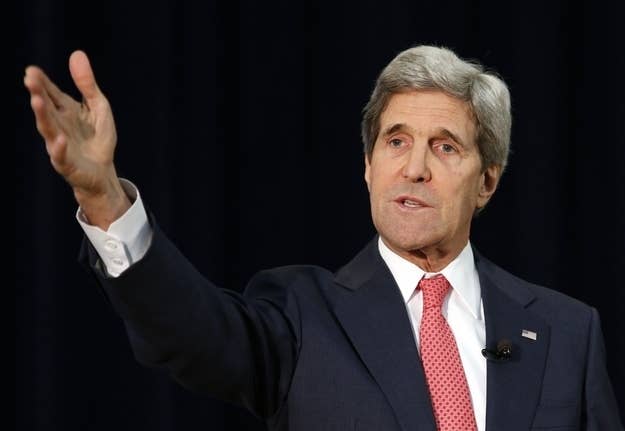
The Ugandan president committed to meeting with American "experts" on homosexuality to try to change his mind about the Anti-Homosexuality Act signed into law last month, U.S. Secretary of State John Kerry said on Tuesday during a forum at the State Department moderated by BuzzFeed.
Museveni claimed to have signed the law, which imposes up to a lifetime prison sentence for homosexuality, after being convinced no one is "born gay."
"I talked personally to President Museveni just a few weeks ago, and he committed to meet with some of our experts so that we could engage him in a dialogue as to why what he did could not be based on any kind of science or fact, which is what he was alleging," Kerry said. "He welcomed that and said that he was happy to receive them and we can engage in that kind of conversation... maybe we can reach a point of reconsideration."
Kerry suggested this conversation was an example of the "tailored approach" the State Department is now developing to respond to anti-LGBT laws currently in place in around 80 countries worldwide. Shortly before his remarks, the Congressional Black Caucus sent a letter to Kerry urging it to examine relations with all countries with anti-LGBT laws, not just Uganda.
In response to a question about what the State Department was doing to guide its response to the Uganda law and U.S. aid to the country, Kerry said the State Department was "formulating those guidelines right now." Sources on Capitol Hill have said the Obama administration has kept lawmakers in the dark about how it intends to respond to the Uganda situation.
"There's been already a review taking place," Kerry said, to examine policy towards all countries where homosexuality is criminalized, "to figure out what the options are as to how we can begin to change minds, move leaders, reach the public, the same kind of education that took place frankly here in our country."
This is a broad review encompassing around 80 countries that "have laws of one kind or another that discriminate," Kerry said.
He said he had already charged U.S. diplomats to make the case against discrimination during a meeting two weeks ago with chiefs of U.S. missions.
"We talked about how everybody in everyone of those consulates and embassies is going to have responsibility now to become an advocates with facts," Kerry said. "It's going to have to be strategic country by country. I don't think you're going to find different countries will have different needs, different sensitivities. So we're going to try to put together the overall umbrella program tailorable, obviously, region by region and country by country."
